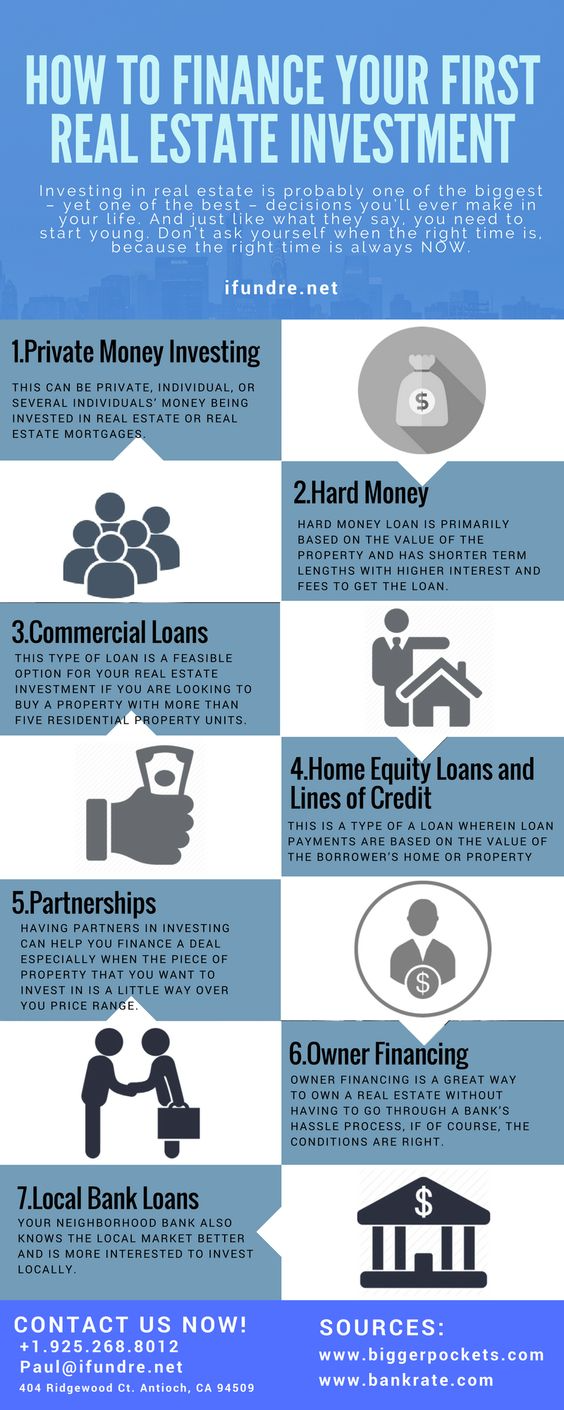
Your name, real estate entrepreneur — has a nice ring to it doesn’t it? There’s a reason why successful entrepreneurs and investors love buying properties for the long haul. Real estate can be super profitable if you play your cards right. It not only diversifies your investment portfolio but also brings in extra income. If you’re wondering how to start funding, read on.
Below are ways to finance your first real estate investment. You may find the infographic below helpful, credits to the people at ifundre.net.
Private Money Investing
These are individuals or groups who lend money for real estate investments. Think of it like borrowing from a friend or an investor instead of a bank. You’ll get approved based on a personal relationship and trust, often less formal than hard money loans. These private lenders usually charge higher interest rates because of the increased risk, and they don’t have the same strict regulations as banks.
The repayment period is more flexible, depending on the agreement you make with the lender. So if you’re having trouble qualifying for a traditional loan, private money can be a great alternative to get your real estate project off the ground.
Hard Money Loans
Similar to private money lenders, hard money loans are short-term loans, often 6 months to a few years, based mainly on the value of the property rather than your credit score. These loans are great for people who might not qualify for regular loans due to credit issues or need money fast. They can be a lifesaver if you need quick cash for a property flip or a renovation project.
Commercial Loans
Commercial loans are designed for purchasing, developing, or refinancing multiple properties or commercial properties like offices and shopping centers. You usually need a larger down payment, often 20% to 30% of the property’s value. These loans can have shorter terms, like 5 to 20 years, but the monthly payments might be based on a longer amortization schedule, like 25 or 30 years. Sometimes, a balloon payment is required at the end of the term. These loans help businesses expand their real estate portfolios but require thorough financial evaluation and a solid business plan.
Home Equity Line of Credit (HELOC)
If you already own a home and have built up equity, you can take out a HELOC to finance your investment. It’s like having a credit card that’s tied to the value of your home. You can borrow money as needed, up to a certain limit, using your house as collateral. It’s great for home renovations or big expenses, but remember, since your home is on the line, you need to make sure you can handle the repayments. This can be a cost-effective way to get the funds you need.
Real Estate Partnerships
Teaming up with other investors can help you pool resources and share risks. This way, you don’t have to come up with all the money yourself. They share the profits or losses from those investments. It’s like going in on a project with your friends to make it happen, but instead of building a treehouse, you’re buying real estate.
Owner Financing
Sometimes, instead of going through a bank for a mortgage, you work out a deal directly with the seller. The seller acts like the bank, and you make payments to them over time instead of getting a loan from a traditional lender. It can be a win-win situation if you need some flexibility with your financing or if you’re having trouble getting approved for a mortgage.
Local Bank Loans
This is the most common method. You get a mortgage from a bank or credit union, just like you would if you were buying a house to live in. You’ll need a decent credit score and a down payment, usually around 20%. Interest rates are generally lower than hard money or private loans. You can get longer payment terms up to 15-30 years.
These options has its pros and cons, so it’s important to do your homework, speak with a financial expert and figure out what works best for you and your investment goals. More tips on how to get started in real estate investing here. If you’re ready to take the leap into real estate investing, we can help you find the right property.




